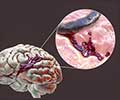A new study used Artificial intelligence (AI) to predict the stroke recurrence at 3 and 12 months on an individual level, and knowing this risk has clinical value for doctors and for patients.

The number of people living with stroke is estimated to rise by 27% between 2017 and 2047 in the European Union, mainly due to an increase in the number of people over 70.
The research, conducted by scientists from Vall d’ Hebrón University, Barcelona, Spain, used a dataset of 41,325 patients admitted with a stroke diagnosis in 88 public hospitals over six years, and fed them into an AI-based model which was able to provide an individualised risk of stroke recurrence at three and 12 months.
The study used calculations based on both non-modifiable risk factors, such as age and ethnicity, and modifiable lifestyle risk factors and habits such as smoking, weight, blood pressure and cholesterol, diet, obesity, physical activity levels and treatment compliance, as well as socio-economic factors.
These can be used to make a more accurate prediction of an individual’s risk of having a stroke recurrence, within 3 months, one year, and more than a year, helping to prevent a recurrence and improve patient’s treatment adherence.
This data may be used to create a much more personalized prediction of if, and when, patients might have another stroke, and that by explaining the impact of individual risk factors.
Advertisement
Patient awareness and empowering self-care are crucial to reduce the risks of recurrent stroke. This study will help inform the personalization of a recently developed app, NORA and greatly improve patients’ risk management.
Advertisement
Source-Medindia















